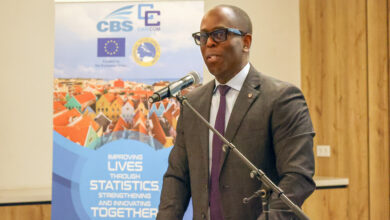(CARICOM Secretariat, Turkeyen, Greater Georgetown, Guyana) If the Region is to play a meaningful role in the global information society, all the stakeholders of the Region, particularly the public and private sector, civil society and non governmental organisations will need to enter a partnership in which the roles are clearly supportive of each other.
This was the view expressed by Ambassador Lolita Applewhaite, Deputy Secretary-General of the Caribbean Community (CARICOM) in an address to the 25th Annual Conference and Trade Exhibition of the Caribbean Association of National Telecommunications Organisation (CANTO), held recently in Trinidad and Tobago. Describing telecommunications as the “foundation of the information infrastructure and the economy”, Ambassador Applewhaite said that information and communication technologies had the potential to transform the regional economies and redefine the Region’s competitiveness.
It was against this backdrop, she said, that the Conference of Heads of Government at its recent meeting in Georgetown devoted time to discussing the implications of the information society and the opportunities presented by ICT for combating the challenges posed by the vulnerabilities of small economies and by the global economic and financial crisis.
Ambassador Applewhaite stated that the Heads of Government had fully recognised that information and knowledge are strategic resources for governments and citizens, and a “powerful transformative tool in the trade arena”.
In this regard, one of the decisions of the Heads of Government was for the Ministers with responsibility for ICT to propel the development of a comprehensive Plan on ICT for development which should reflect the major policy goals of the Region including affordable and secure access to ICT; interconnectivity within the Region; the promotion of low cost software solutions; and the promotion of more public-private partnerships; and the identification of opportunities for the integration of ICTs that will support good governance.
The Deputy Secretary-General noted that an enabling environment must first be created for that plan to be “meaningful and easy to implement”. That enabling environment, she said, “must of necessity” point to elements including measures for improving human skills and the capacity to apply ICTs; and building a legal and regulatory framework that can create confidence and support the growth of E-commerce.
Perhaps one of the greatest enablers that can be formulated for the easy implementation of the regional ICT plan, she noted, was the collaboration, cooperation and partnership in order to form working consortia for regional action.
“Any regional ICT plan must recognise that ICT infrastructures, facilities and capabilities are global and regional public goods, the social and overall benefits of which exceed specific benefits to any single person or country,” Ambassador Applewhaite stated. “It cannot be brought to life without a serious examination and commitment to regional and global cooperation, premised on the principles of, a spirit of partnership, mutual support and respect, opportunities for regional cooperation and positive, independent relations with governments,” she added.
Earlier in the week the Deputy-Secretary General had lauded the achievements of CANTO on the occasion of its 25th Anniversary.
CANTO provides a forum in which equipment manufacturers, network operators, service and application providers can discuss the development of new market opportunities, and share experiences in the field.





